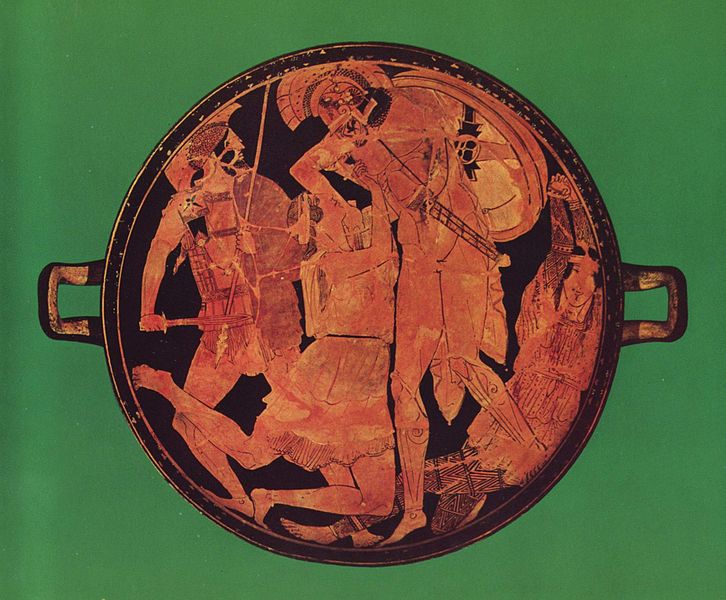
May 19, 2014, by Richard Rawles
Beginnings and Endings (1)
Helen’s last post has combined with a research paper given last week in our research seminar to make me think about beginnings and endings in Greek literature: appropriately enough, since the questions is in part ‘when to stop?’, I shall post about this in two parts.
If epic means ‘a long poem about history’, this puts a special pressure on beginnings and endings: it always could start or finish in a different place. (This applies however you define history: in Greek, any mythological story at least could start from a theogony, and continue down the genealogies to the present-day descendants of gods and heroes…) And even though we think of Greek epics (early ones, anyway) as performance literature, performance doesn’t seem to have resulted in length restrictions. The Iliad is 15 000 lines long and would take several days to perform in its entirety (nor is the Iliad a maximum length: Nonnus’ Dionysiaca is 48 books long, and the Indian epic Mahabharata is longer again).
The paper was by Oliver Thomas, about the reception of the Homeric Hymns in the fifteenth century. The detail that caught my eye in this context was a manuscript owned by the great scholar Cardinal Bessarion, in which the Iliad was immediately followed by Quintus of Smyrna’s epic Posthomerica (Greek τὰ μεθ’ Ὅμηρον: ‘The stuff after Homer’). Bessarion was so pleased with his discovery of this poem, which fills in the story of the Trojan War between the funeral of Hector (i.e., the end of the Iliad) and the start of the Odyssey, that he arranged for it to be written in a book which started with the beginning of the Iliad but then carried right on through Quintus to the Odyssey.
The Iliad as we have it ends with this line:
Ὣς οἵ γ’ ἀμφίεπον τάφον Ἕκτορος ἱπποδάμοιο.
‘Thus they busied themselves with the burial of Hector, tamer of horses.’
(Ἕκτορος ἱπποδάμοιο ‘of Hector, tamer of horses’ is a ‘formula’, i.e. a group of words which a performer-poet could deploy together to express a particular idea, in this case ‘of Hector’, in a particular part of the metrical verse – but for ‘of Hector’ in this place, there are two options, and the other is Ἕκτορος ἀνδροφόνοιο ‘of man-slaying Hector’. The end would feel quite different if the other option had been chosen…)
The poem ends with neither Hector’s death, nor Achilles’ death, nor the fall of Troy, but with a funeral. When I taught my Iliad module last semester I talked about this in part by stressing the importance of funerary ritual throughout the poem. I wanted to show that it ‘works’ for the Iliad to stop here, and that thinking about why it works helps us to understand the poem better. And I think it does…
But why do we want to feel that a poem ends in ‘the right way’? Why does it need to end at all? Life doesn’t fall into self-contained episodes; history doesn’t end at all.
For some people, the end of the Iliad was only to a very limited extent an ending anyway. Bessarion had a book made by which the whole story could be told together: read this way, the Iliad is just one episode. And Quintus’ project, to fill in the gap between Iliad and Odyssey, was not new. Already in late archaic Greece, there was a ‘cycle’ of epic poems covering the whole story of the Trojan war, including Iliad and Odyssey. If you wanted to know about the death of Achilles, that came in the next poem, the Aethiopis, which started with the arrival of the Amazon Penthesilea to fight with the Trojans.
We know that in some ancient copies the last line of the poem was even changed to smooth the transition:
Ὣς οἵ γ’ ἀμφίεπον τάφον Ἕκτορος· ἦλθε δ’ Ἀμάζων
‘Thus they busied themselves with the burial of Hector; and the Amazon came’
…
Picture: Achilles kills the Amazon Penthesilea. Name-vase of the Penthesilea Painter. Munich, Staatliche Antikensammlungen 2688. ca.470-60BC https://en.wikipedia.org/wiki/File:Akhilleus_Penthesileia_Staatliche_Antikensammlungen_2688.jpg
See also the great pot by Exekias in the British Museum: http://www.britishmuseum.org/explore/highlights/highlight_objects/gr/b/black-figured_wine_jar.aspx

At one point we had a builder working on the house who was really into Homer and was very excited indeed to learn of the existence of Quintus of Smyrna. It’s these small life-changing moments…
[…] few weeks ago I posted about beginnings and endings in ancient literature, and called the post ‘Beginnings and endings (1)’. So I must go […]